Why you can trust Tom's Hardware
All test results marked with "PBO" reflect configurations tested with AMD's auto-overclocking Precision Boost Overdrive feature. For overclocking, we tuned our memory to DDR4-3600 for both Intel and AMD platforms.
This set of tests focuses narrowly on the Core i7-10700K's price band, but we have comparisons to the Core i5-10600K and other modern processors in gaming and application work on the final page of the review.
VRMark and 3DMark on Intel Core i7-10700K

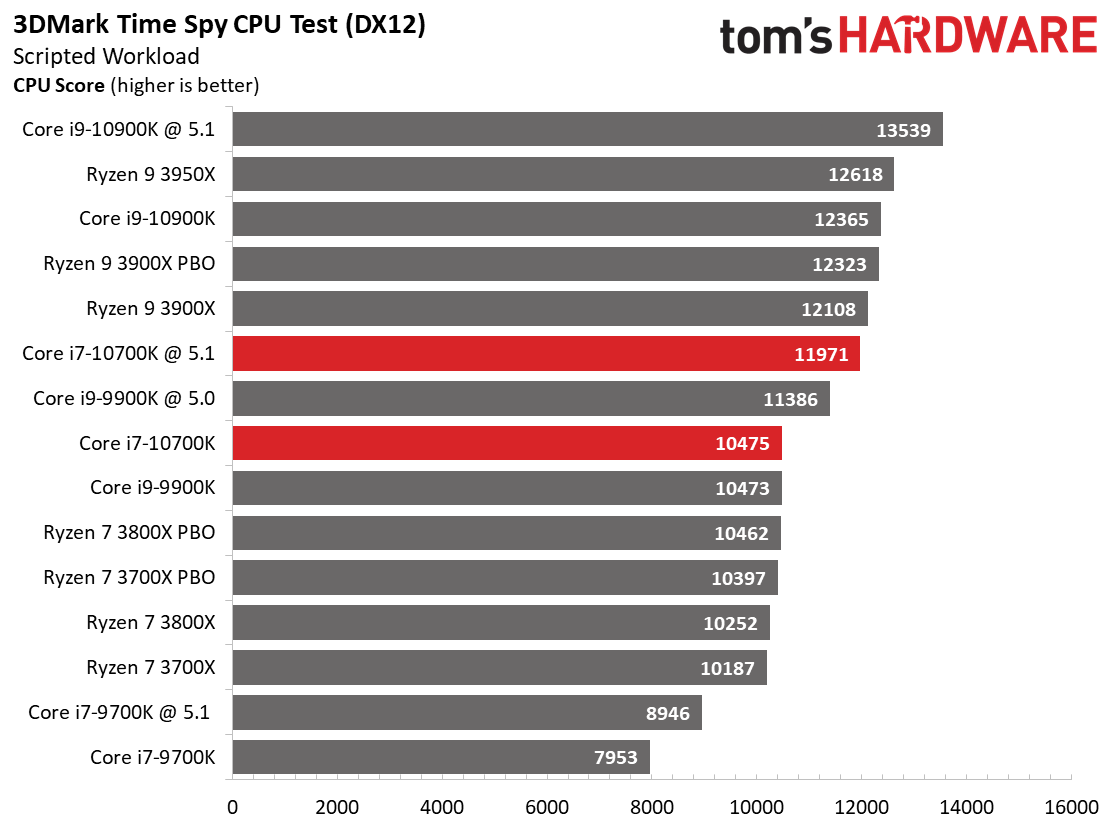
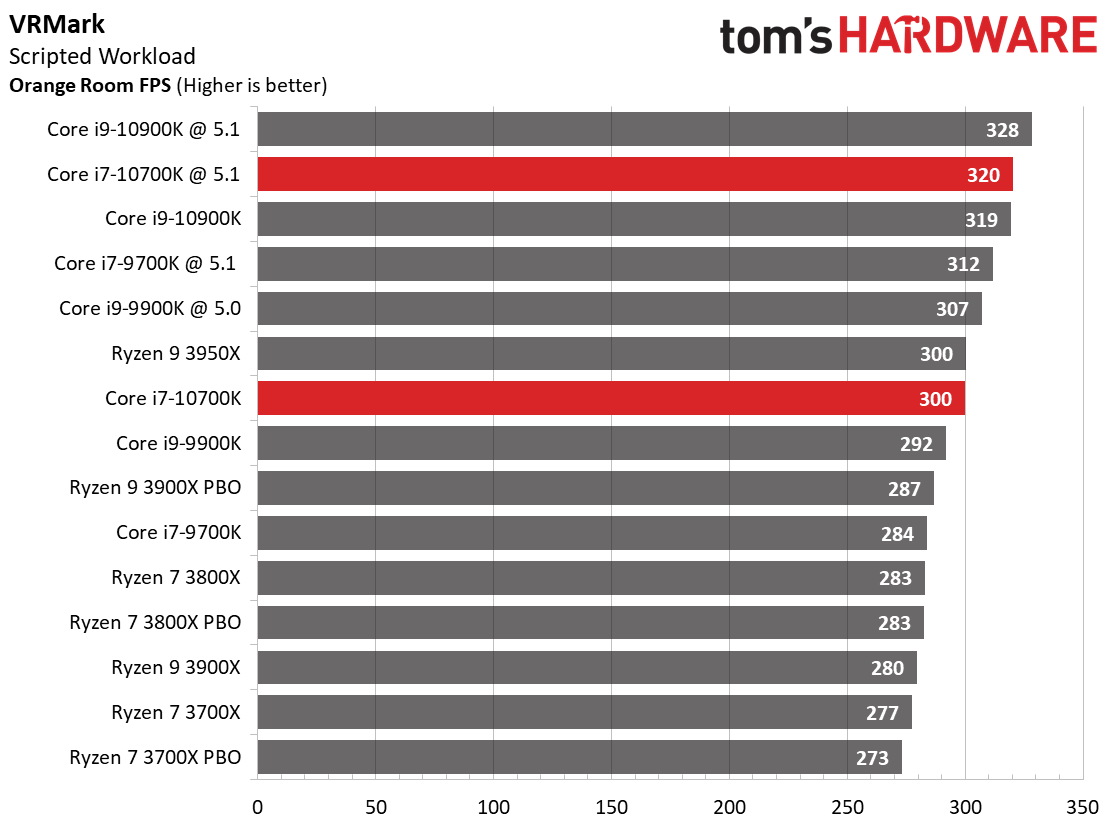
Synthetic gaming benchmarks often aren't generally indicative of real-world performance, but the 3DMark DX11 and DX12 tests are interesting because they measure the amount of raw computational horsepower exposed to the game engine. For now, most of today's game engines don't scale as linearly with additional compute resources, but these tests help us gauge how games could exploit processing resources as the engines become more sophisticated.
The $387 (MSRP, current street prices higher) Core i7-10700K falls into the bottom portion of the Fire Strike test results, grappling with the $300 Ryzen 7 3700X. Surprisingly, the ever-so-slightly-faster $329 Ryzen 7 3800X trails both of those contenders by roughly 500 points. Meanwhile, the 10700K's sixteen threads respond more readily in the Time Spy benchmark as it distances itself from the Ryzen 7 models, and overclocking expands the lead. However, the Ryzen 9 3900X steps in with a lead in both tests, even beating the overclocked 10700K. That's important to keep in mind, as recent deep price cuts find the 3990X hovering at the ~$410 price point.
VRMark's test values per-core performance (a mixture of frequency and IPC), and it obviously prefers physical cores and lots of L3 cache. The Core i7-10700K's high clock speeds pay dividends in this benchmark, and we see what will become a familiar trend: The Core i7-10700K is faster than the Core i9-9900K that retails for $488 (MSRP, current street prices higher). Given the Core i7-10700K's similar eight-core 16-thread design and much lower pricing, it's clear Intel has moved quite a bit forward on the value front as a response to the Ryzen 3000 series processors.
Civilization VI AI and Stockfish on Intel Core i7-10700K
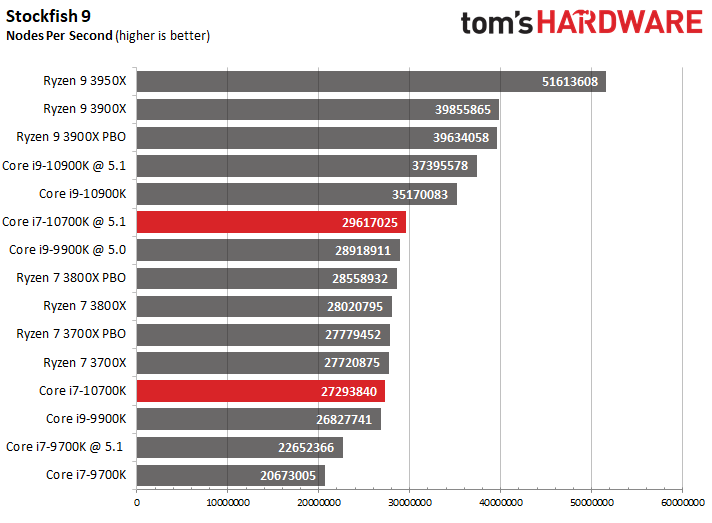
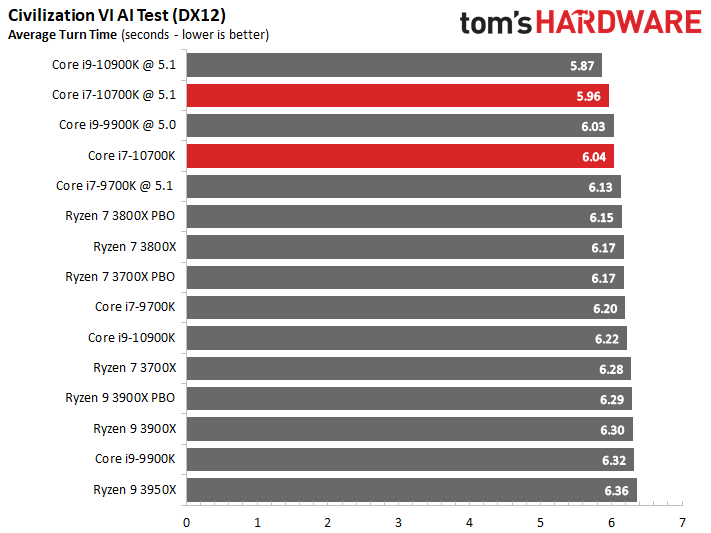
Stockfish, an open-source chess engine, is designed to extract the utmost performance from many-core chips by scaling well up to 512 cores. It isn't surprising to see the Ryzen 9 3950X take the lead, but its 16 cores and 32 threads set the benchmark for the highest-end of the mainstream X570 platform, and also the highest pricing at $740. The Core i7-10700K lands near the bottom of the chart but beats the Core i9-9900K at stock settings. Overclocking gives the 10700K the lead. The Ryzen 9 3900X is also impressive in this test, especially in light of its new lower pricing at retail.
Civilization VI's AI engine values per-core performance, which benefits Intel's higher clock rates. Chips without hyper-threading usually fare the best in this title, but the 10700K's 5.1 GHz boost clock propels it above the 9700K's 4.9 GHz. The Core i7-10700K lands behind the 9900K running at 5.0 GHz despite its dual-core 5.1 GHz boost at stock settings. The disparity likely comes as a result of the time taken to transition to the boost clock and the efficacy of Turbo Boost Max 3.0 thread scheduling, which can vary based on its ability to identify and schedule threads to the fastest cores. Overclocking rights that slight disparity, though, as the 10700K takes second to the 10900K.
Get Tom's Hardware's best news and in-depth reviews, straight to your inbox.
Ashes of the Singularity: Escalation on Intel Core i7-10700K
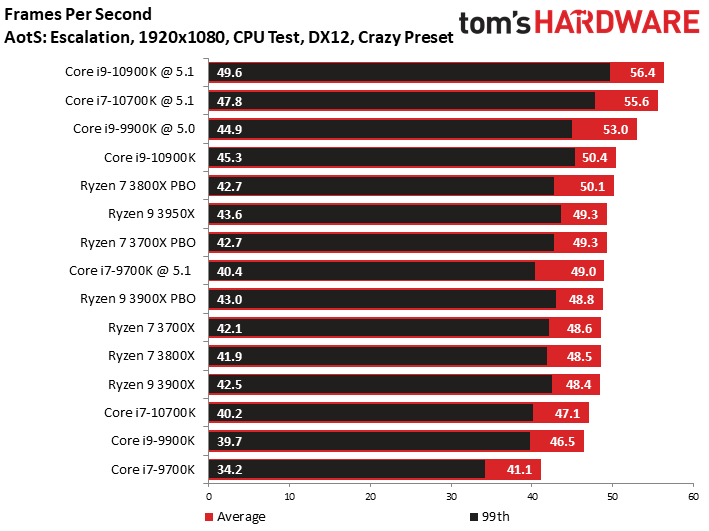
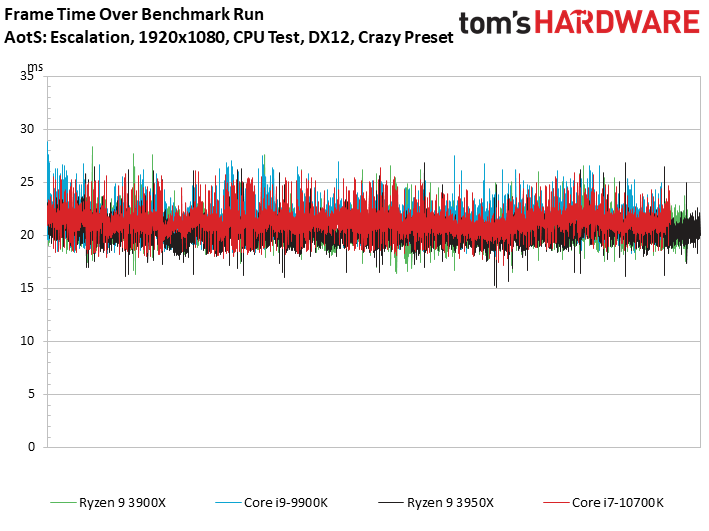
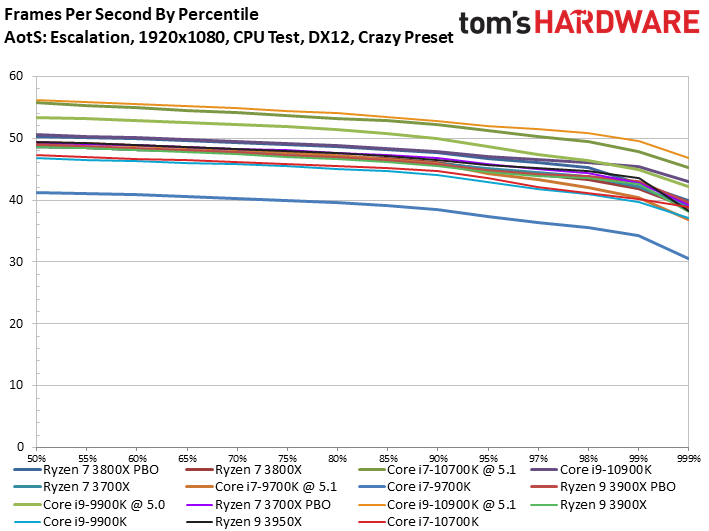
Ashes of the Singularity: Escalation loves cores and threads, but clock rates also play a role. Intel's addition of threading to the Core i7 series pays off as the 10700K edges past the 9700K and 9900K at stock settings, but this title still plays exceedingly well with the Zen 2 architecture, granting the stock Ryzen models an across-the-board lead. That changes when we kick up the voltage on the 10700k, which, after overclocking, trails only the 10900K.
Dawn of War III on Intel Core i7-10700K
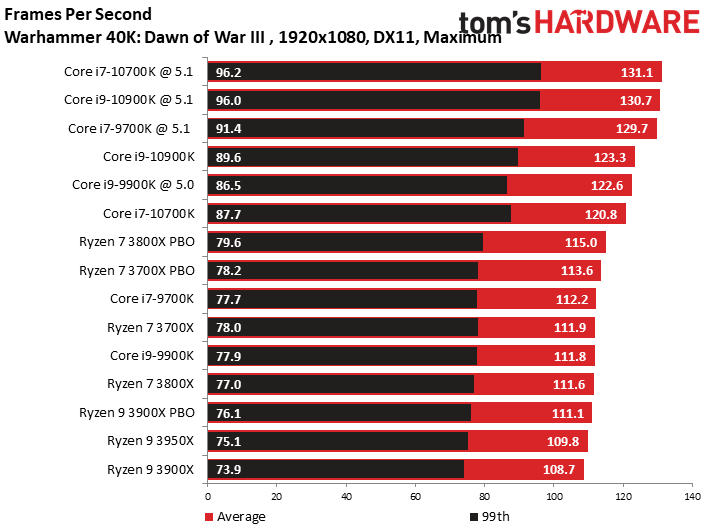
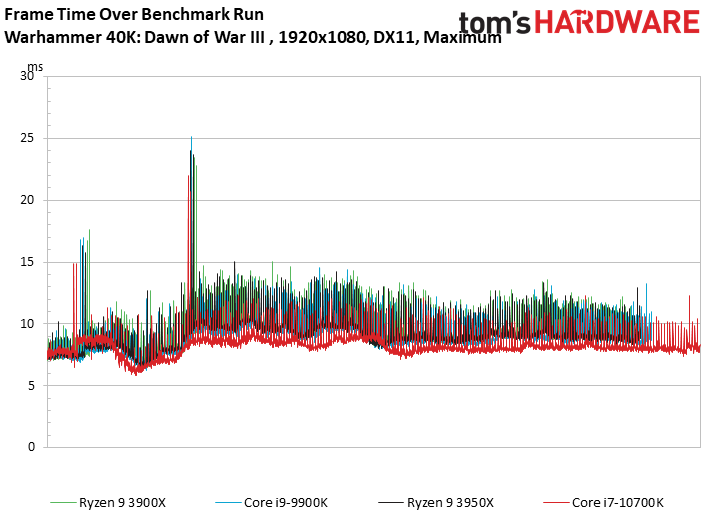
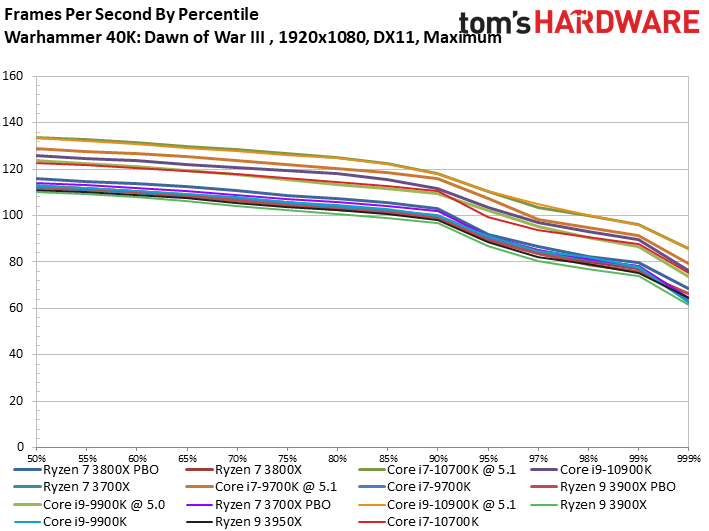
The Warhammer 40,000 benchmark responds well to threading, but it's clear that clock speed and IPC also matter. The stock Ryzen processors fall down the charts in this title, though the Ryzen 3 3700X carves out a win against the 9900K. The 10700K beats the Ryzen competition at stock settings and takes the overall lead after tuning.
Far Cry 5 on Intel Core i7-10700K
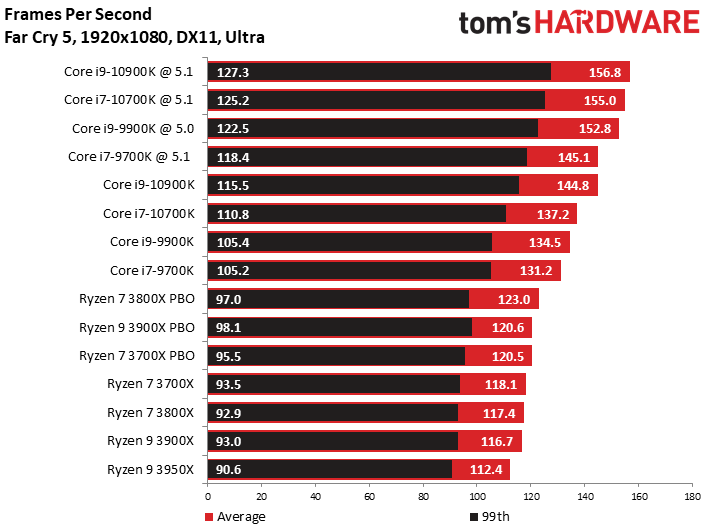
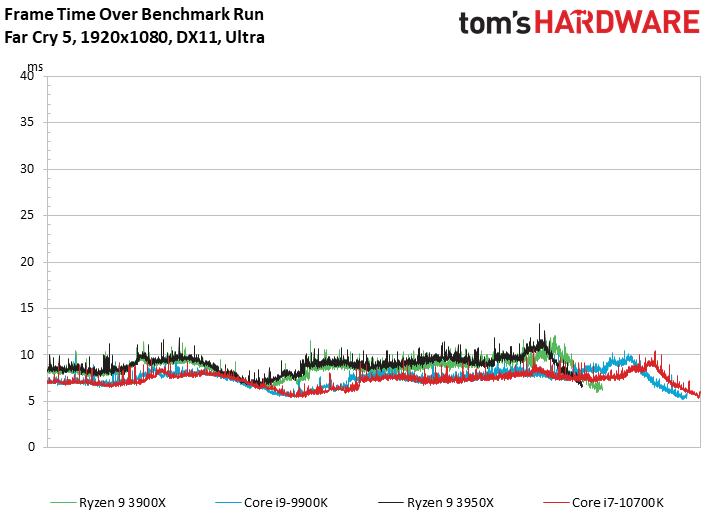
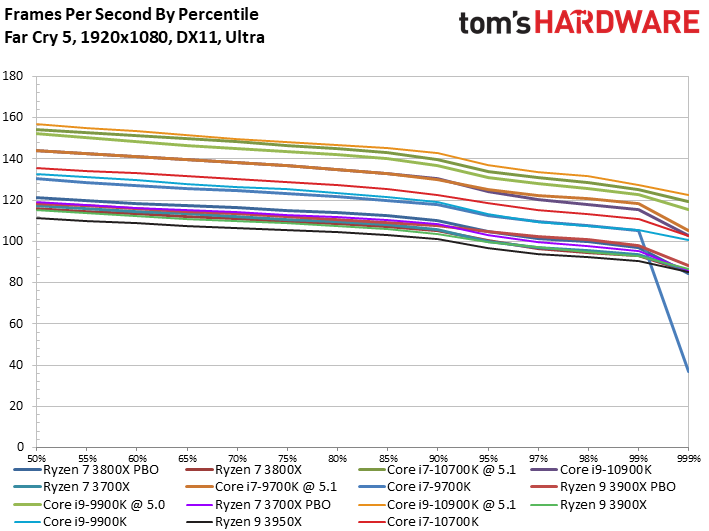
Far Cry 5 tends to run well on Intel architectures, which is a tendency we see as the Intel processors all beat the Ryzen competition. The 10700K carves out a substantial lead over the the 9700K again and marks a nice step forward over the 9900K. The 10900K is impressive in this title in both stock and overclocked settings, though it only leads the overclocked 10700K by a slim margin.
Final Fantasy XV on Intel Core i7-10700K
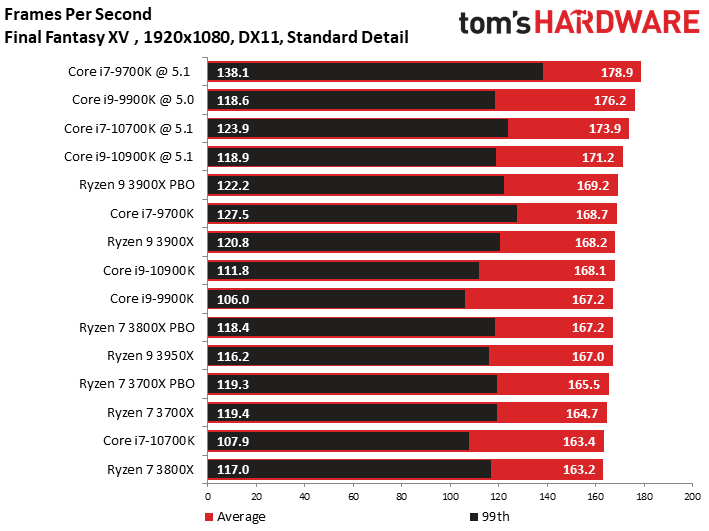
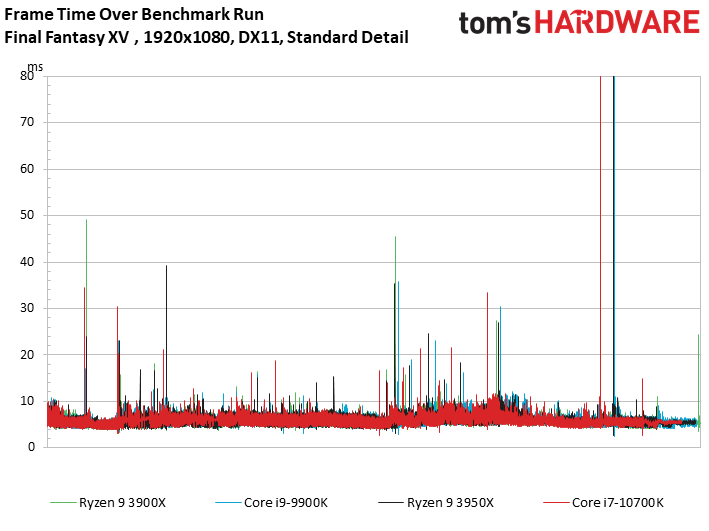
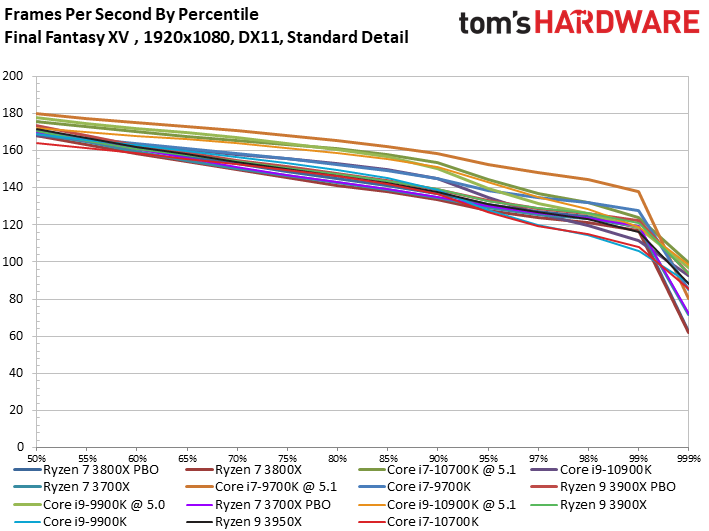
We run this test with the standard quality preset to sidestep the impact of a bug that causes the game engine to render off-screen objects with the higher-resolution setting. We're clearly approaching a graphics limitation with these core-heavy chips, but this title obviously prefers to run on physical cores, lending the 9700K the overall win. The overclocked Ryzen 9 3900X also puts up a tough fight as it outpaces all of the stock Intel processors except the 9700K.
Grand Theft Auto V on Intel Core i7-10700K
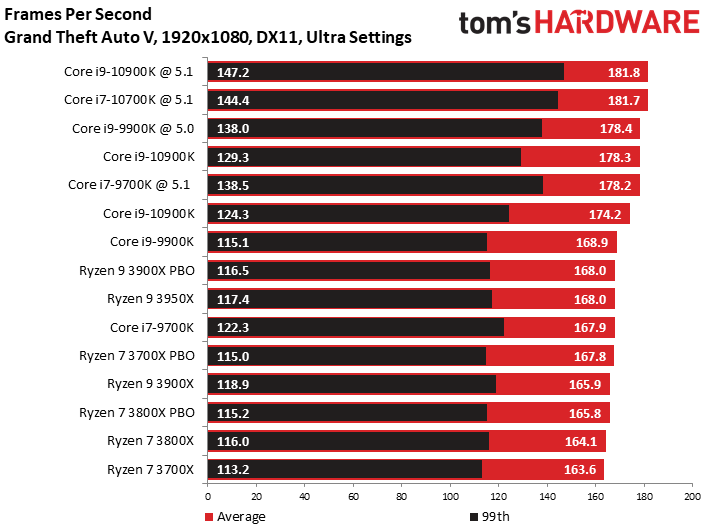
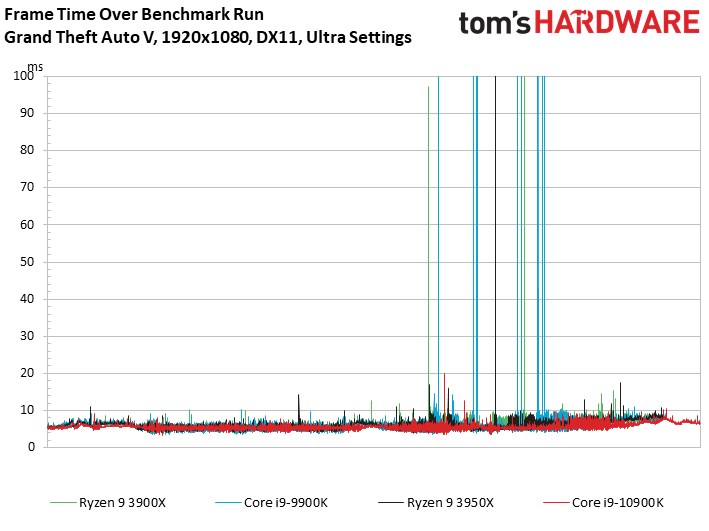
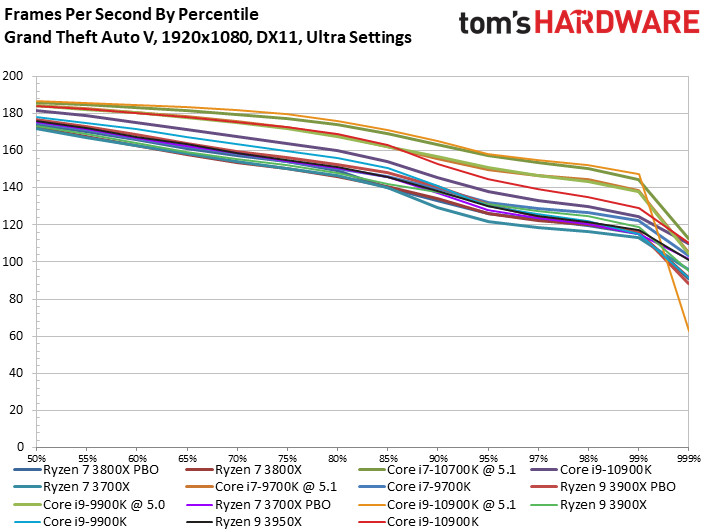
The overclocked 10700K essentially ties the 10900K in this benchmark. It's clear that enthusiasts who aren't afraid to overclock and are primarily focused on gaming can save some money by going with the 10700K if they're after that last bit of performance advantage. After overclocking, the deltas between the 10900K and the 10700K aren't worth the premium for the i9 model. Instead, spend that money on a better cooler or graphics card.
Hitman 2 on Intel Core i7-10700K
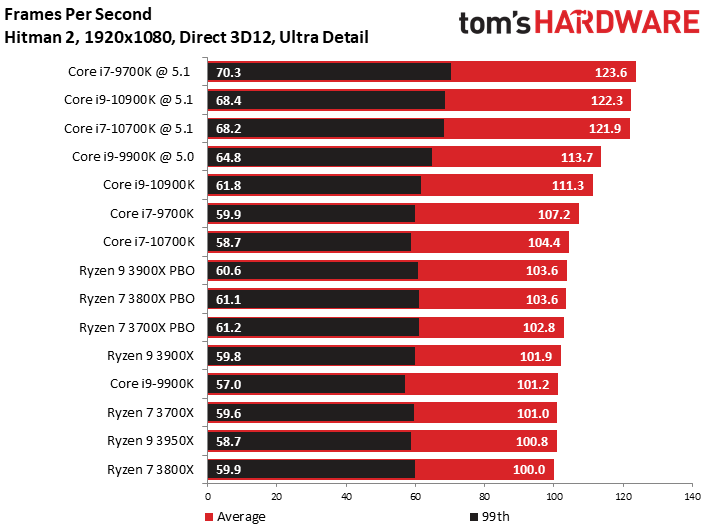
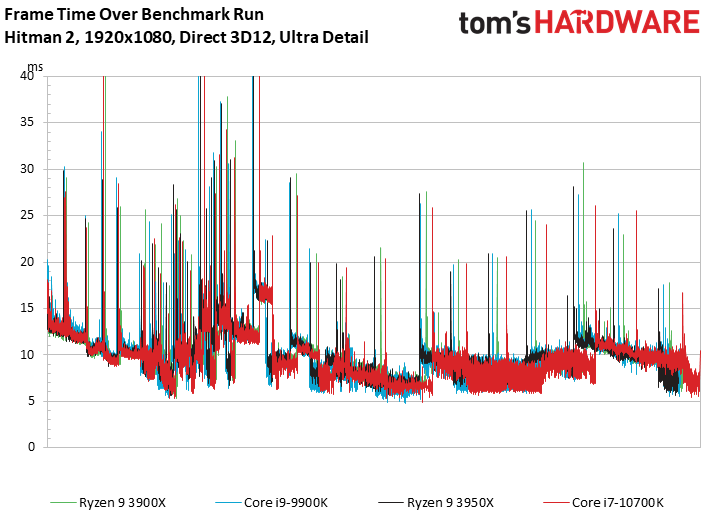
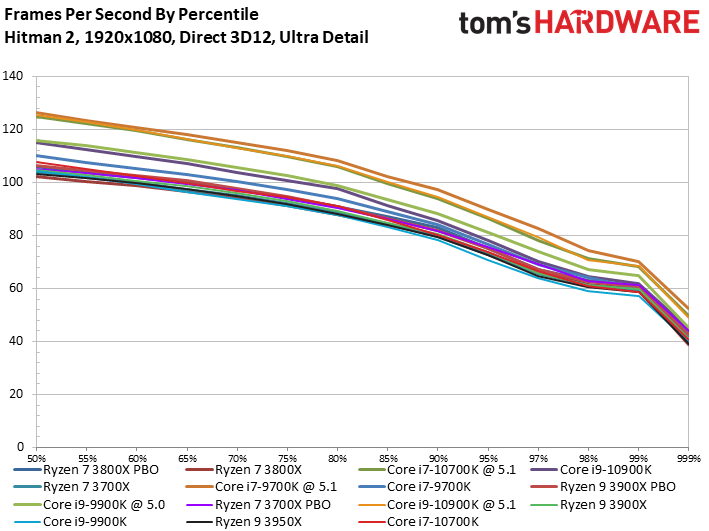
The Core i7-9700K remains impressive as it edges out the 10700K at both stock and overclocked settings. Meanwhile, the Ryzen processors populate the bottom of the chart in the company of the stock 9900K.
Project Cars 2 on Intel Core i7-10700K
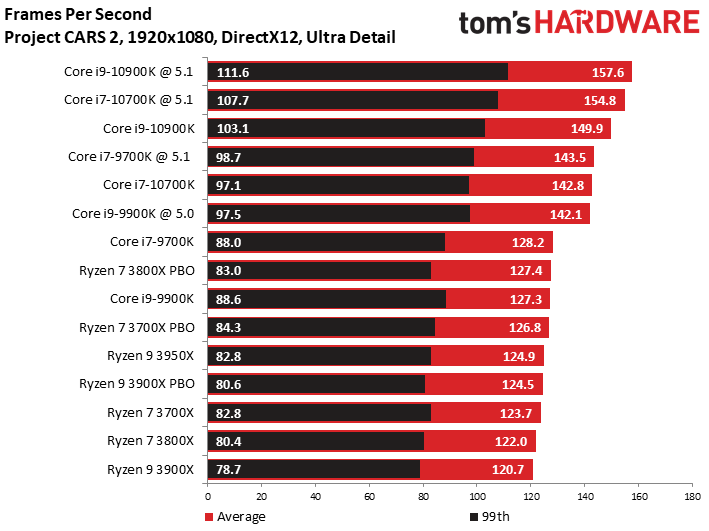
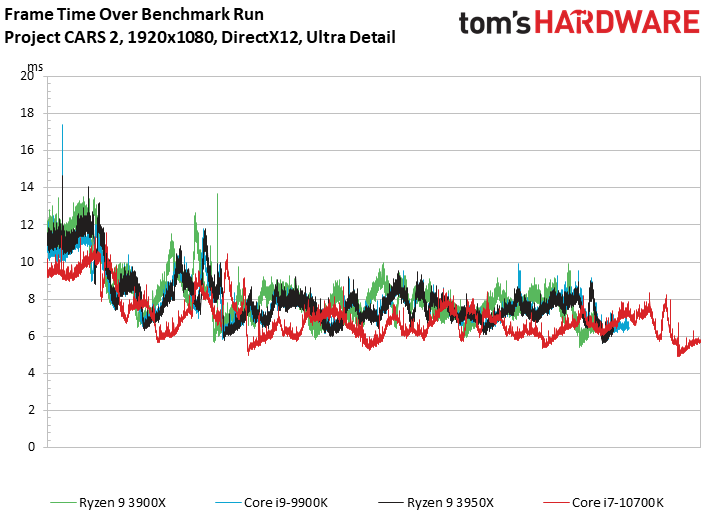
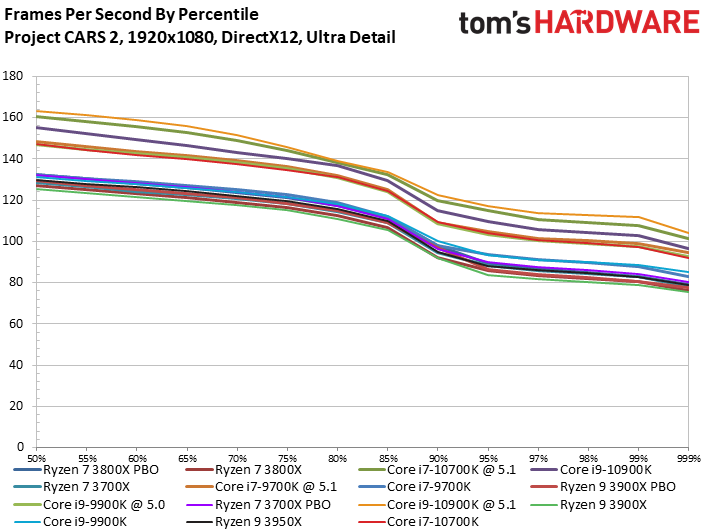
Although Project CARS 2 is purportedly optimized for threading, clock rates obviously affect this title's frame rates. The 10700K beats out the overclocked 9900K here, which is an impressive achievement.
World of Tanks enCore on Intel Core i7-10700K
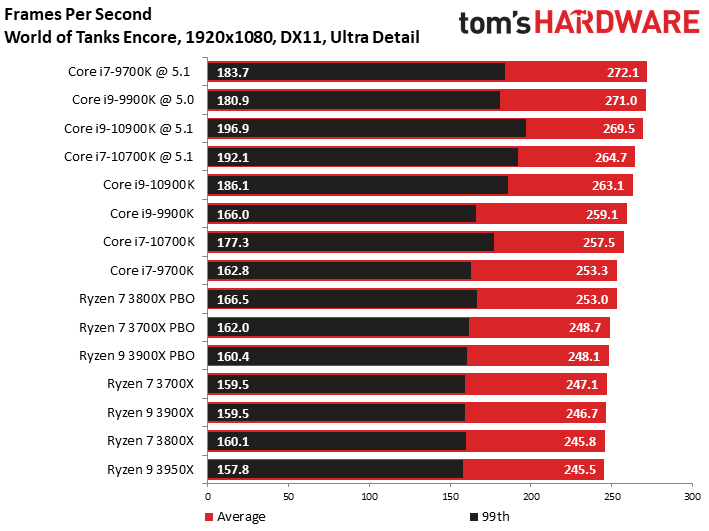
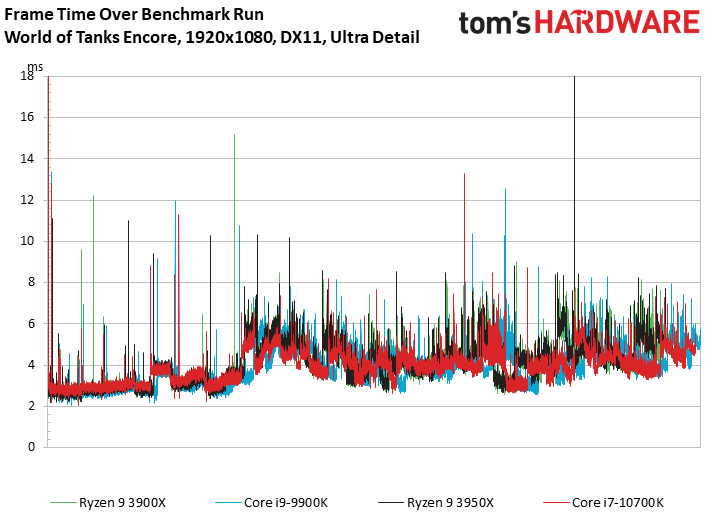
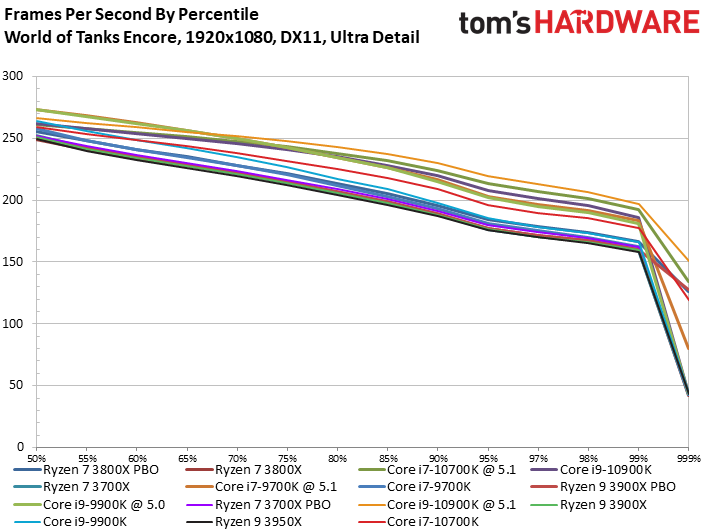
MORE: Best CPUs
MORE: Intel and AMD Processor Benchmark Hierarchy
MORE: All CPUs Content
Current page: Intel Core i7-10700K Gaming Benchmarks
Prev Page Core i7-10700K Power Consumption, Thermals, Overclocking, Test Setup Next Page Core i7-10700K Application Benchmarks
Paul Alcorn is the Editor-in-Chief for Tom's Hardware US. He also writes news and reviews on CPUs, storage, and enterprise hardware.
-
jgraham11 Wow that's high power consumption! Good thing you are running liquid cooling! Compare that to the AMD 3700X at half the power!Reply
Look at the shorter tests, the Intel systems seems to do better until their turbo runs out. AMD seems to do better with anything that takes more time.
I realize that both AMD and Intel systems are overclocked but the AMD systems seem to do better with memory tuning, maybe instead of just using PBO (a one click solution), take the same time you use for the Intel processors and put that into the memory. AMD would show even better in games and anything that was memory intensive.
1440p gaming would be more relevant! I do realize it doesn't make for good looking graphs but 1080p is not the typical use case for this CPU and comparable GPU.
Good review overall. Pretty fair way of presenting the information. Good memory choices. Efficiency focus was great to see.
Way better than the typical casting AMD CPUs in bad light, for example where Toms put the 3400G ($159) against the Intel 9700k($379.00). -
RodroX Good review, too bad at this price point you only show 1920x1080p game results.Reply
I understand thats the only way to keep GPU from been a "bottleneck", but if I was to spend this much money I would aim for playing at 1440p High details.
I still think that no matter what you wana play, the resolution and/or refresh rate, at this point in time the best bang for the buck for ultrafast FPS is the Core i5 10600K + high speed memory, and you feel like it some quick brainless overclocking.
Other than that just pick the Ryzen your wallet can buy and be happy. -
DrDrLc Look... Can we actually get gaming benchmarks with modern games and at higher resolutions?Reply
Intel keeps on saying that they are better for gaming because of single-threaded 1080p benchmarks, but we don't game like that with 2080ti cards. We don't build $2000 machines with one of the most expensive gaming cards to run 1080p ffs.
Are you going to give us next gen graphics card benchmarks only at 1080p?
If not, can we actually see what this new CPU will look like in comparison to others at resolutions that we use? We've been watching all the review sites doing this for three or four years now... It's Intel's marketing strategy, and you are letting them do it, and playing along! It's a problem, because we don't have any reviews that actually show us what to buy for the way that we actually play games. These are reviews are actually useless for gamers. -
barryv88 I find it downright shocking to see that popular hardware review sites such as Tom's are still harping so much on HD gaming results.Reply
Yes, game results at HD are less GPU bound, but it only paints Intel in a good picture while hiding a rather shocking truth - that AMD is incredibly gaming competitive at the world's sweet spot for gaming resolutions. Q H D. (Typically 2560x1440).Tom's explicitly stated in the past that QHD is the best area for gaming given that screens today with G/Fsync/144hz+ options cost less than $500 and are very affordable in general, today. 4K is still too high for most GPU's to handle, meaning that QHD fills a good middle ground at the end of the day, beating HD at higher image quality.
Really Tom's, get your act straight. It's time to nudge your audience towards higher gaming echelons.
Start publishing QHD CPU results in addition as this will entice people to make the switch towards higher res gaming but also this - AMD Ryzen CPU's in general are less than 5% slower than Intel chips at QHD or 4K FPS. Intel is therefore NOT the indisputable king as no god given person can tell such a small difference in high res FPS. Enough with the gaming myths! Ryzen CPU's tend to pack more cores that actually makes them far more future prove. If most of those cores sit idle in today's gaming, who cares? Wouldn't you rather have enough cores in reserve for more future demanding games and enjoy streaming/recording quality with extra muscle under the hood to enjoy less stutter? Call me stupid, but to me this actually makes Ryzen a better gaming choice.
Your article adds to this whole HD stagnation thing that's been going on for over 10 years. Over 90% of steam players still game at HD. It's time to give em reason to make the next push - QHD and then 4K.
Make a start. I challenge Paul Alcorn to do a "world sweet spot QHD CPU FPS" article. Get around 10 people or so to game on both Intel and AMD machines. Gather the results and lets see if Intel still holds the crown. -
Drunk Canuck The only downside is how hot the 10700K gets. When I got mine, I ran a stress test at stock and it hit 74 degrees with a Fractal Celsius S24 AIO with my case open (Define R6) for maximum airflow and all fans running. It gets into the mid 80's when the case is closed. I'd assume I'd get those temperatures with the case open when overclocking and that's a bit much.Reply
I will say this though, my new system runs Doom Eternal really well. Basically everything cranked to high or ultra at 2K resolution with a GTX 1070. -
milleron This year, many will be building new computers mostly dedicated to Microsoft Flight Simulator 2020. In the past, flight sims were more likely to be CPU-bound than GPU-bound, but it's not clear that that's any longer the case. Is there any way to predict before final release of this much-anticipated game whether it will benefit more from single-core clock speed or multi-threading? Would anyone hazard a guess on whether to plan an Intel or Ryzen build?Reply -
RodroX Replymilleron said:This year, many will be building new computers mostly dedicated to Microsoft Flight Simulator 2020. In the past, flight sims were more likely to be CPU-bound than GPU-bound, but it's not clear that that's any longer the case. Is there any way to predict before final release of this much-anticipated game whether it will benefit more from single-core clock speed or multi-threading? Would anyone hazard a guess on whether to plan an Intel or Ryzen build?
You should wait for reviews when its launched.
Other than that this is the best you can check right now: https://www.pcgamer.com/microsoft-flight-simulator-system-requirements/
Im guessing any Ryzen 5/7 3xxx will play nice, probably thye Ryzen 7 3700X could be a cheaper, yet very good option vs the i7 10700K.
And if rumors becomes true the new Ryzen 4xxx could be a new jewel for gaming. But that wont be out till atleast the end of september. -
st379 There are still 1080p 240hz monitors that are being sold.Reply
1080p ultra is very realistic, Paul did not test it at 1080p low he tested it on max settings.
It is not like some review sites that test at 720p low or even worse at 480p.
This is a cpu review not a gpu.
In gpu review I would expect it to be tested in 1080p up to 4k, maybe even 8k. -
RodroX Replyst379 said:There are still 1080p 240hz monitors that are being sold.
1080p ultra is very realistic, Paul did not test it at 1080p low he tested it on max settings.
It is not like some review sites that test at 720p low or even worse at 480p.
This is a cpu review not a gpu.
In gpu review I would expect it to be tested in 1080p up to 4k, maybe even 8k.
True, but it does not change the fact that there are also more and more 1440p monitors sold everyday. And when you spend this amount of money for a CPU many people will also consider a high end GPU with a 1440p monitor for gaming, thus it will be very nice to have those results. -
barryv88 Reply
DX12 should remove alot of CPU bottleneck and hopefully we'll see great core scaling if all pans out for the engine. I for one would like to see how the engine handles scenery draw and how smooth everything will translate to FPS.milleron said:This year, many will be building new computers mostly dedicated to Microsoft Flight Simulator 2020. In the past, flight sims were more likely to be CPU-bound than GPU-bound, but it's not clear that that's any longer the case. Is there any way to predict before final release of this much-anticipated game whether it will benefit more from single-core clock speed or multi-threading? Would anyone hazard a guess on whether to plan an Intel or Ryzen build?